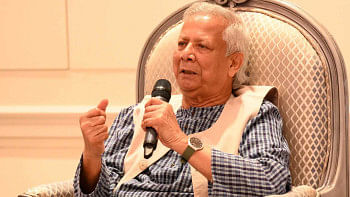Contribution of Zia recalled
Speakers at a discussion yesterday recalled contributions of late president Ziaur Rahman and said this valiant freedom fighter had introduced Bangladesh in the world community through his tireless efforts.
They said that Zia had united the nation and inspired the people to join in the War of Liberation through the proclamation of independence and led the war from March 26 to April 17, 1971.
BNP organised the discussion at the Engineers' Institution to mark the 64th birth anniversary of Ziaur Rahman. Presided over by the Deputy Leader of the Opposition Prof AQM Badruddoza Chowdhury, it was addressed, among others, by BNP secretary general Abdul Mannan Bhuiyan, Oli Ahmed MP, Major Gen (Retd) Subed Ali Bhuiyan, Major (Retd) Shahjahan Omar, Major (Retd) Hafizuddin Ahmed, Redwan Ahmed and Naim Jahangir.
Due to the revolutionary steps of Zia, they said, Bangladesh marched towards rapid development and self-reliance. Zia elevated the country to a dignified position in the comity of nations.
Speakers said Zia orchestrated concept of seven-nation SAARC and played a key role in halting the Iran-Iraq war, and in OIC. They recalled the contribution of Zia in restoring multi-party democracy, building friendly relations with the Islamic world, consolidating hard-earned national independence and sovereignty and his role in regional and global peace moves.
Prof Badruddoza Chowdhury said Ziaur Rahman, "... was not afraid or a coward... rather, he was an absolute patriot."
Criticising the Awami League leaders for forgetting their responsibilities on the eve of the Liberation War and onwards, he said the people of the country hasn't forgotten that Ziaur Rahman proclaimed independence.
Describing the present government as an 'evil' one, he said the liberty and independence of the country were being endangered by it.
Mannan Bhuiyan said the spirit of liberation was destroyed by Awami League by introducing the one-party BAKSAL system after independence.
Recalling the Liberation War, Col (Retd) Oli Ahmed said the people had not heard Sheikh Mujibur Rahman make any declaration of independence although it was being propagated that it was he who had proclaimed independence.
Oli, a renowned freedom fighter 'categorically' said Ziaur Rahman proclaimed the independence on March 27 as a provisional head of the state.
"The name of Sheikh Muzibur Rahman was included in the declaration on the following day when a journalist suggested to do so to win more public support in favour or independence," he claimed.
On the current political impasse, Oli said the BNP was ready to hold dialogue with the government to resolve the crisis, but the AL Government had betrayed the main opposition as it was yet to implement the 4-point agreement signed twice in parliament.
"There cannot be any dialogue with betrayers. AL not only betrayed BNP but also the nation through signing various treaties and agreements against the interest of the country," he added.
Subed Ali Bhuiyan said Shaheed Zia proclaimed the independence ignoring all fears and future consequences. He said Zia was the only army officer, who had refused to accept any government residential plot distributed among the army after the independence, and his honesty is unquestionable.
Freedom fighter Naim Jahangir said the government in exile and Awami League leaders staying in Calcutta during the Liberation War hurriedly involved India with the war as they apprehended that the power might go to the freedom fighters after independence.
He said the Razakars collaborated with the Pakistani occupation forces for an undivided Pakistan while the 'so-called freedom fighters' who stayed in Calcutta during the Liberation War was busy pleasing India in order to come to power.
Redwan Ahmed said Sheikh Mujib didn't give any directions prior to surrender to the Pak army, Bangalee jawans, BDR and police personnel would not have been killed if there had been any instructions from him.
He said it was Ziaur Rahman, who proclaimed the independence and called for an all-out war against the Pakistani occupation forces. He said Zia led the war from March 26 to until the formation of the Mujibnagar government on April 17, 1971.
Major (Retd) Hafizuddin Ahmed said that he went to Calcutta for two days during the Liberation War and was astonished to hear something from Awami League leaders.
He said that AL leaders in Calcutta asked him as to why the war had been started, because they (AL) had completed other arrangements with the Pak ruler. He asked all to read a press release signed by Dr Kamal that had appeared in papers on March 25, 1971.
The release stated that the dialogue with President Yahiya 'was satisfactory,' he informed.

 For all latest news, follow The Daily Star's Google News channel.
For all latest news, follow The Daily Star's Google News channel. 



Comments